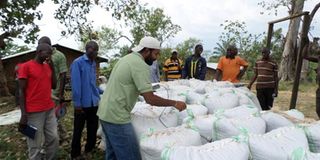Connecting small-scale farmers to agribusiness enterprises

A trader negotiates with cocoa farmers in Bundibugyo. Encouraging entrepreneurship among smallholder farmers would help achieve higher production, food security and better incomes. FILE PHOTO
Africa Agribusiness Academy (AAA) has launched a village farm model system through which Ugandan smallholder farmers will be linked to small- and medium-sized enterprises (SMEs) and other agri-entrepreneurs.
The objective is to stimulate entrepreneurship to increase food security in Africa, according to Mable Namala, AAA’s business club coordinator.
Create links
Speaking at the launch of Kaamu Development Initiative (KaDI), a 500-member farmers’ organisation in Kibuku District, she noted that smallholder farmers can progress through creating linkages with larger agribusiness entreprises, which are willing to support them and buy their produce.
“Working in isolation and not having a business mindset hampers progress. It is illogical to work alone as individualistic tendencies breed unnecessary competition among farmers yet they ought to be learning from each other,” she observed.
“AAA will only support a united group of farmers with the agribusiness mindset and networking is very important.”
Work directly
In this way, entreprenuership is stimulated to increase food security in Africa by a vibrant SME sector.
This is through supporting existing agribusiness SMEs, which work directly with local farmers.
About 80 per cent of the food produced in Africa is grown on smallholder farms. Thus, SMEs are essential in connecting small holder farmers to the market. They deliver the product to the consumer thereby turning the agricultural smallholder into an engine of growth.
However, Jacob Olanya, the transaction liaison officer at Fit Uganda, points out that even with associations aimed at growing themselves, farmers continue to make losses mainly due to lack of information on markets of different commodities, weather, seed suppliers and where to get capital for farm investment.
Importance of information
Olanya explained, “Majority famers live in rural districts yet most lack access to the range of information and financial services needed to boost their business. In addition to market linkages farmers must be helped to easily access both information free of charge and also loans for farm investment.
The contribution of agriculture to the economy has been declining over the years due various reasons including lack of information both on the side of farmers, potential funders and agencies.”
A 2013 market analysis report on advancing agribusiness in Uganda, which was published by Infotrade, states that agriculture provides approximately 82 per cent of employment and most industries and services in the country are dependent on this versatile sector supporting millions of livelihoods. However, despite this, it is among the least funded areas.
“This is a great opportunity for business and entrepreneurship promotion for the smallholder farmers,” says Dr Stephen Birungi, the executive director, KaDI.
“We live in the information age; the biggest problem however is lack of it. But also, those with knowledge choose to either keep it to themselves or use it to rip off others. Worse still, they do not know how to get it to those it most benefits.”
About Academy
Africa agribusiness academy is an entrepreneur-network organisation seeking to foster innovation and growth of small- and medium-scale agribusiness firms in Africa.
The ultimate objective is to contribute to economic growth and improvement of rural incomes and food security.
The academy operates in Uganda, Tanzania, Kenya, Ethiopia, Rwanda and Malawi and aims to reach atleast one million smallholder farmers by 2017. For effectiveness, farmers of the same interests, for instance, those in dairy cattle farming, are categorised into communities of practice.




